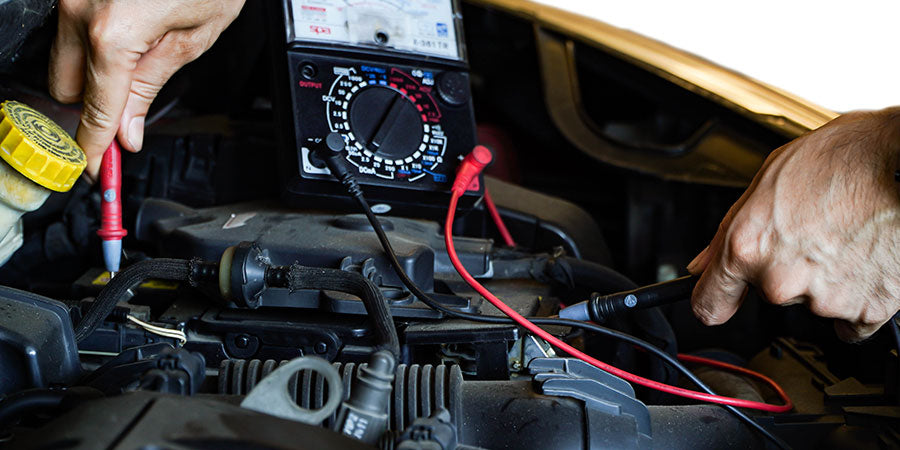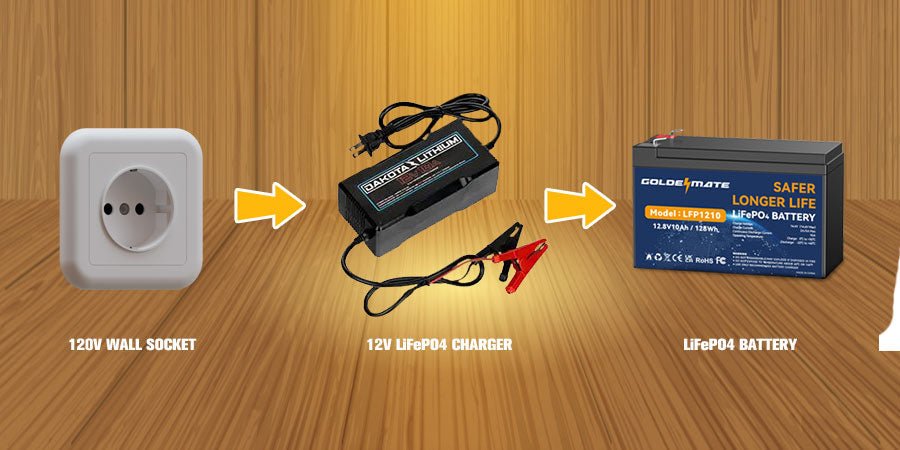Lithium Iron Phosphate or LiFePO4 batteries have become popular in recent years. This has happened for various reasons. Some of these reasons are safety, long lifespan, and their high efficiency. However, users always ask a specific question about these batteries. This question is whether they require a special charger or not. Some users think it might be due to its difference. They think the Lithium Iron Phosphate or LiFePO4 batteries use a special kind of charger. The LiFePO4 battery is unlike the normal lead-acid and other lithium-ion battery types. Those ones have a different technology when it comes to charging. These unique charging characteristics must be taken into account. It helps the batteries to work with the best efficiency and still preserve its lifespan.
In this article, we will talk about the charging features. We would also explore the requirements of the LiFePO4 battery. We will talk about why you should use a dedicated charger. Also the best ways to maintain your LiFePO4 battery. To learn about the basic features of this battery. You can check out our other articles

Understanding the Charging Requirements of LiFePO4 Batteries
A battery, no matter the type, needs to be charged properly. This will help maintain the battery health and improve efficiency and performance of the battery. Charging a battery the proper way is very important. For the LiFePO4 battery, this is the same.
The LiFePO4 battery operates in a different way than other battery types. The battery chemistry is different and requires being charged in a specific way. This special charging manner would help keep damage at bay and also increase the longevity of the battery. Understanding these charging processes would help a user maintain safe battery practices.
Do LiFePO4 Batteries Need a Special Charger?
We will answer this key question in this article. Yes, LiFePO4 batteries require a special charger. There is a charger specifically designed for the LiFePO4 battery. This charger is built specifically to suit the chemistry of the battery. The batteries can at times be charged with a regular standard lithium-ion charger. They can also be charged with a standard lead-acid charger. But using any of those two charger types can lead to damages. Examples of these damages are undercharging, overcharging and reduced battery life. With the use of any other charger, these three things can happen. So as to prevent this from happening, a special battery built just for the LiFePO4 battery exists. This specialized charger makes sure that the battery is charged perfectly. It uses the right voltage and current regulation. It also comes with some protective features.
What Makes LiFePO4 Batteries Different?
Now, how are these LiFePO4 batteries different from other types of batteries? The LiFePO4 batteries are different from other batteries. There are the lithium-ion and lead-acid batteries. This is as a result of their unique voltage. The LiFePO4 batteries have a pretty unique voltage profile.
They also have a stable chemistry and a good charge cycle behavior. These batteries work at a normal voltage of 3.2V per cell. This means a 12V LiFePO4 battery consists of four cells. They can be calculated as 4 x 3.2V = 12.8V, while a 24V LiFePO4 battery consists of eight cells. This difference in configuration of their voltage requires a special charger. The charger has to be capable of handling the LiFePO4’s specific voltage for charging. It also needs to be able to handle the current limits of the battery.
Charging Voltage and Current Considerations
To charge a battery, the charger has to be able to supply it with a controlled voltage and current. This would help the battery restore the stored energy in it. The LiFePO4 batteries have a very specific voltage and current they need to get charged. These requirements are set to help prevent any kind of damage. They also help increase the performance of the battery. This is why a special charger must be used. The chargers should be able to supply the batteries with the right voltage and current. Using anything else would affect the health of the battery and also its performance.

Why a Dedicated LiFePO4 Charger is Important
A single charger dedicated to the LiFePO4 battery is important. This is because the battery needs to be supplied with the right amount of voltage and current. In lead-acid chargers, this is quite different. The lead-acid chargers make use of a technique called trickle charging. The LiFePO4 chargers make use of the constant current/constant voltage. It is also called the CC/CV approach. This approach to charging is important. It helps maintain the health of a LiFePO4 battery.
Charging Profile Differences from Lead-Acid and Other Lithium Batteries
In lead-acid chargers, a bulk, absorption and float charging process is applied. This charging process is not good for the LiFePO4 batteries. The batteries do not require a float charge so using chargers like this is not available.
In lithium-ion chargers, they deliver a high voltage. Sometimes this voltage can be too high. When this happens the voltage can surpass the safe limit of a LiFePO4 battery. This can lead to the generation of excess heat and cause damage to the battery.
LiFePO4 chargers on the other hand would apply the correct voltage to a battery. They do not surpass the voltage cutoff and don’t include a float stage. This prevents cases like overcharging and battery degradation.

Risks of Using the Wrong Charger
When a user makes use of an unsuitable charger to charge a LiFePO4 battery, different issues may come up. Some of these issues are;
Undercharging: When a lead-acid charger is used for a LiFePO4 battery, issues can arise. An example is not charging fully. This would lead to a case of reduced capacity in the battery. It will also affect the battery’s runtime.
Overcharging: In case of using a charger that is not compatible with the LiFePO4 battery, excess voltage might be used. The charger might send more voltage than needed to the battery. This can damage the cells of the LiFePO4 battery. Damage to the cell can lead to a reduction in the battery’s lifespan. It can also give rise to safety hazards.
Inefficiency: In terms of inefficiency, using a charger that isn’t suitable for the LiFePO4 battery can lead to a delay. The battery might take longer to charge. In the process energy can be lost and wasted.
Features of an Ideal LiFePO4 Battery Charger
There are certain characteristics to a proper LiFePO4 battery charger. These LiFePO4 chargers also have some particular features. The ideal charger for a LiFePO4 battery would improve the safety of the battery. It will also increase the longevity of the LiFePO4 battery. When picking a charger, the following features and characteristics should be taken into account.
Voltage and Current Regulation
The first things to look out for is the voltage and current regulation of the charger. The charger must be able to provide a certain voltage and current to charge your LiFePO4 battery effectively.
In terms of voltage regulation. The charger should be a fit for the specific voltage the LiFePO4 battery requires. An example is the 14.6V for a 12V LiFePO4 battery.
In terms of current, the charger should be able to produce the needed charge for the battery. The battery capacity must be taken into consideration and the charger matching it. This will prevent excess heat and irregular wear and tear.
Battery Management System (BMS) Compatibility
A Battery Management System or BMS is a technology used to prevent cases like overcharging, over-discharging, and overheating. It can be installed in batteries or manufactured with them.
In most LiFePO4 batteries, this Battery Management System or BMS is built into them. They help to protect the battery from damages that can happen while charging.
Whatever charger choice a user makes for their LiFePO4 battery, the BMS must be considered. The charger must be compatible with the BMS technology. This would make sure the LiFePO4 battery charges smoothly. It would also help the protective measures on the battery work properly. This way the battery charges properly and is also protected from damage.

Best Practices for Charging LiFePO4 Batteries
There are certain practices while charging that damage the battery. There are also some charging practices that help the battery charge better. Following these good charging practices is advisable. It will make sure your LiFePO4 battery stays in good health. It will remain at optimal performance and also have a long lifespan.
Recommended Charging Cycles
The recommended charging cycles for a LiFePO4 involves the following. The use of a charger that is designed specifically for LiFePO4 batteries. They should also have the right voltage profile.
Another is avoiding discharging the battery below a certain percentage. Mostly between 10-20% capacity before recharging. This practice will help improve the lifespan of the battery.
Lastly, make sure to charge the battery full. While doing this always avoid leaving it plugged in for a long period of time or excessively. Once it reaches full charge, unplug it. This will help prevent overcharging the battery.
Avoiding Overcharging and Undercharging
Overcharging a battery can lead to degradation of the battery cells. They also pose a risk to safety. Using a charger with the right voltage regulation can help prevent this. It doesn’t just protect the battery but also protects the user.
Undercharging on the other hand is also just as dangerous. When undercharging happens over and over again, the battery might develop a reduction in its usage capacity. Basically, the battery doesn’t last as long as it is supposed to again. This can be prevented by using a charger that can charge the battery fully. It also has to be able to do this within the specified limits of the battery.

Conclusion
LiFePO4 batteries require a special charger that is designed to match them. It matches their unique charging characteristics like voltage and current needed. Using a charger that is not suitable for the LiFePO4 battery can give rise to certain issues. Things like reduced performance, a reduction in battery life or even complete damage.
Using a proper LiFePO4 charger will provide safe charging. It will also keep the battery at maximum efficiency and protect the lifespan. Understanding the importance of using the right charger and following best charging practices is important. It helps users maximize the benefits of their LiFePO4 battery systems. If you’re not sure of what LiFePO4 battery to get, you can check out our page.



Share:
What Is the Difference between a 12V 100AH Battery and a 24V 100AH Battery?
Is It Better to Have Two 100AH Lithium Batteries or One 200AH Lithium Battery?